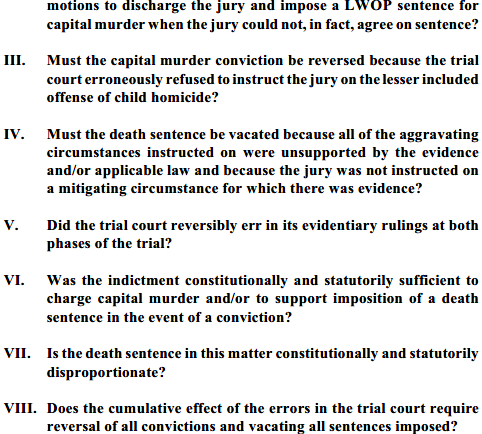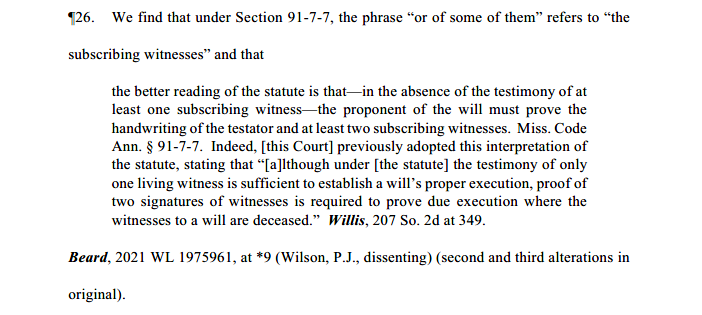I did not post Court of Appeals decisions on Tuesday because I was in an all-day deposition and went from there to a pinewood derby. I will try to catch up on those later. But today the Mississippi Supreme Court handed down two opinions. One deals with the MTCA’s venue provisions in a wrongful-death case and the other disposes of an appeal of felony convictions and sentencing with an interesting Fourth Amendment analysis.
Jones County v. Estate of Bright, 2021-IA-00631-SCT (Civil – Wrongful Death)
Reversing the circuit court’s denial of venue change in an MTCA case stemming from a police chase that killed a bystander, holding on interlocutory appeal that under the MTCA venue was only proper in the counties where the administrative offices of the political-subdivision defendants are located (Jones or Lauderdale), and not where the acts or omissions occurred (Pearl River) because the state was not a named defendant.
(8-0: Chief Justice Randolph did not participate)
Fisher v. State, 2021-KA-00828-SCT (Civil – Felony)
Affirming convictions of drug possession and trafficking charges and sentencing as a habitual offender, holding that the defendant was not denied the right to testify on his own behalf where the record was silent as to whether he wanted to testify, that there was no Fourth Amendment search when officers climbed a ladder in a common area with the building owner’s permission to look into the defendant’s ceilingless storage unit, and that resentencing was not necessary because the trial court imposed the mandatory minimum for the aggravated trafficking conviction not on his habitual offender status that was determined without sufficient evidence.
(9-0)
Other Orders
In Re: Commission on Mandatory Continuing Legal Education, 89-R-99011-SCT (granting Petition of the Mississippi Commission on Continuing Legal Education allowing attorneys to complete their CLE obligations set forth in Rule 3 through online, webinars or live, in-person programs for the 2022-2023 CLE reporting year)
In Re: Rules Governing Admission to the Mississippi Bar, 89-R-99012-SCT (granting Petition to Amend the Rules Governing Admission to the Mississippi Bar filed by the Mississippi Board of Bar Admissions; denying Petition to Amend Rule IV §8 of the Rules Governing Admission to the Mississippi Bar filed by Jefferson Carl Harvey on April 21, 2022 and the Emergency Petition to Amend Rule IV Section 8 of the Rules Governing Admission to the Mississippi Bar filed by Applicant 11596 on June 25, 2021; and dismissing Petition for Ruling Regarding Motion #2022-1321 A/K/A “Petition to Amend the Rules Governing Admission to the Mississippi Bar” filed by Jefferson Carl Harvey on October 31, 2022)
Rules for Court Reporters, 89-R-99021-SCT (amending The Rules and Regulations Governing Certified Court Reporters)
Beale v. State, 2020-CT-00614-SCT (granting cert)
Devine v. Cardinal Health 101, LLC, 2020-CT-01101-SCT (granting joint motion to suspend cert proceedings and dismiss cert petition as moot)
Adams v. State, 2020-CT-01383-SCT (denying cert)
Adams v. State, 2020-CT-01383-SCT (denying pro se cert petition)
Watts v. State, 2021-KA-00873-SCT (denying rehearing)








